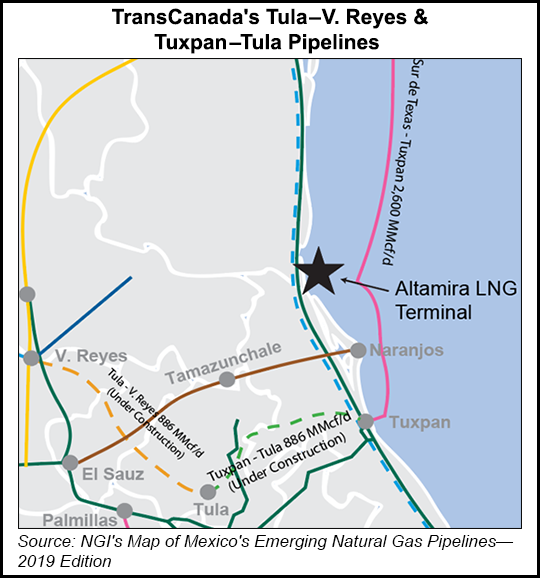Infrastructure | NGI All News Access
López Obrador, CRE Spar Over Mexico Gas Pipeline Contracts
Mexico’s Comisión Reguladora de EnergÃa (CRE) on Tuesday denied a series of accusations made against it regarding construction delays to seven natural gas pipeline systems by President Andrés Manuel López Obrador and the CEO of state power utility Comisión Federal de Electricidad (CFE), Manuel Bartlett.

The accusations relate to delays facing the pipelines that were commissioned by CFE to supply fuel to its growing fleet of combined-cycle thermal power plants.
In a Monday morning press conference, López Obrador alleged that CRE, Mexico’s equivalent of the U.S. Federal Energy Regulatory Commission, had “obligated” CFE to award “unfair” contracts to gas pipeline developers under the previous government, and that CRE had “dedicated itself” to policies favoring “individuals to the detriment” of state-owned companies, namely CFE and national oil company Petróleos Mexicanos (Pemex).
López Obrador and Bartlett said CFE would seek to renegotiate the contracts’ force majeure clauses, which require it to make fixed capacity payments to developers such as TransCanada Corp., Grupo Carso, and Infraestructura Energética Nova (IEnova) for pipelines that have not yet entered operation.
“The decision to carry out tenders for…the transport of natural gas via pipeline to supply its power stations was made by [CFE],” CRE said on Tuesday. “CRE approved the bidding terms, seeking for CFE to obtain the lowest costs as the contracting party, but had no participation in the tender process, or in the awarding and signing of contracts between CFE and the individuals.”
Regarding the force majeure payments, CRE said, “it’s worth emphasizing that, in those cases in which the pipelines have not begun operations, this is mainly due to causes beyond the control of the transporters (social conflicts, delays in the awarding of local permits, legal challenges, among others).”
TransCanada last November halted work on sections of its Tuxpan-Tula and Tula-Villa de Reyes pipelines in Hidalgo state because of an impasse with local authorities.
Construction on Canada-based Atco Group’s Tula branch pipe, also in Hidalgo, has been halted since 2015 because of legal injunctions filed by landowners, despite the fact that a 1.6-kilometer (about one mile) stretch is all that remains to be built.
Hidalgo is also the state in which an explosion along a gasoline pipeline owned by Pemex occurred on Jan. 18. The death toll from the incident had reached 130 as of Wednesday.
IEnova’s Guaymas-El Oro pipeline, meanwhile, has been out of commission since indigenous activists removed a 25-foot segment of the pipe in 2017. A formal resolution for the incident is still pending.
Billionaire Carlos Slim’s Grupo Carso, meanwhile, also is awaiting a court ruling to allow work to proceed on its Samalayuca-Sásabe pipeline across Chihuahua and Sonora states.
CRE said that it acts according to the law and the constitution “to establish a level playing field that permits different participants in the energy industry (productive state enterprises and private companies) to compete under equal conditions, to benefit consumers, adding, “Regulators bring long-term certainty to investments. The ensure that, independent of political changes, projects that promote development and jobs are carried out under the same rules.”
In related news, López Obrador this week submitted to the senate the names of 12 candidates to replace the four CRE commissioners who resigned in recent weeks. With only three of the commission’s seven seats currently filled, it does not have quorum to hold its regular sessions. CRE oversees permitting and regulations governing fuels and electricity in Mexico.
Nearly all of the CRE candidates are former Pemex employees, according to El Economista.
After budget cuts forced CRE to reduce its staff, it said earlier this month it would fold its natural gas, liquid petroleum gas and oil products units into a single hydrocarbons unit.
© 2024 Natural Gas Intelligence. All rights reserved.
ISSN © 2577-9877 | ISSN © 2577-9966 |
